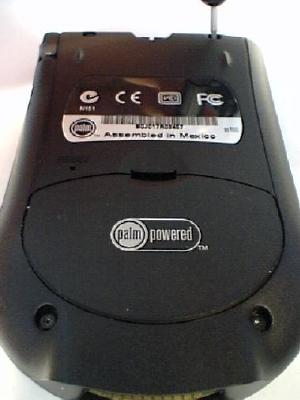First, remove the snap-in hinged cover by gentle prying straight out of the back with a small flat-bladed screwdriver.

Background
My trustworthy Palm Pilot Pro was showing its age, and has already gone through 2 memory upgrades,
button replacement, and screen replacement. After the most recent failure, I purchased one of the
new Palm m100 units to replace it.
The only real drawback I perceive the m100 having relative to the Vx is lack of memory. Fortunately,
the procedure for upgrading the Palm III to 8MB
described by Tim Charron can be adapted to the Palm m100, and in
some ways is somewhat easier since there are fewer wires.
WARNING: What follows is a description of my efforts and results. I share the information
freely so that those who are technically inclined may benefit. I make no claims about
your ability to perform this mod. Unless you are proficient at surface-mount soldering, do
not even consider attempting this.
Accessing the innards
First, remove the snap-in hinged cover by gentle prying straight out of the back with a small
flat-bladed screwdriver.

Next, remove the snap-on coverplate by gently prying back the latch behind and below the
power button, then hinging forward and removing.

The m100 sans snap-on cover:

Next, turn the unit onto its back and remove the four microTorx screws. Unlike the Palm V / Vx, there is no
hotmelt glue sealing the m100, just the four micro-Torx screws. I purchased a micro-Torx set from Jensen Tools (www.jensentools.com),
SKU 289-080 "Micro Torx Screwdriver Set, 4 pc.", for $21 plus shipping. It arrived as one universal handle
and 3 interchangable blades (one was missing), but the largest of the 3 present blades easily opened the Palm.
No glue, no stickers, no hassle.

The m100 readily separates into two pieces, one with the batteries, and one with everything else. There are no wires
connecting the battery unit to the main unit, so the battery half can be laid aside.

The Mod
Identify the 2MB memory chip in the upper left-hand corner of the board.

On my unit it was labeled
M51V18165DSL-6. Carefully unsolder it from the board. I used a RadioShack 15 watt pencil
iron and their DeSoldering Braid, part # 64-2090, to remove the solder from the pins of the chip. Gently pry the chip
up with a small, thin flat-blade screwdriver, applying spot heat as needed to get the legs free. I used an eyeglass
repair screwdriver to pry with.
There is one 0 ohm jumper at the indicated spot to be removed, and one "double jumper" which needs to be moved from one set of pads to another.
Following this modification, the new memory chip (I used a Samsung KM416V4104CSL-5 from Interweb (www.interwb.com (No "E" in interwb))
purchased for $35 + $9 shipping ) was installed, except that _pin 33_ was not soldered down. Actually, I tore the
soldertab when I removed the original chip, but I intended not to solder that pin down anyway. ("Really, I meant to do that." :-)
Addendum:RAM prices are volatile. The (overclockable) 50nsec part
has gone up from $35 to $39. The (regular speed) 60nsec part is still $35.
Double check with the supplier to verify current pricing.
Addendum (2/21/01): Samsung has changed their part number for the
KM416V4104CSL-5 to K4E641612C-50. Pinouts appear the same.


This is a photo contributed by another user of his mod which shows
the area nicely.
As you can see by my photos, I also accidently tore one of the soldertabs on the little "double jumper", and needed to
run a wire to the corresponding DRAM pin. Once done, though, all was well.

And after a few minutes, my data was loaded and I was ready to work.

Bonus benefit:
By using the -5 version of the DRAM, the Afterburner Hack cruises at 26MHz without difficulty. 28MHz works well, but makes the
musical AlarmHack alarms too short. Obviously, your milage may vary, but I've been stable at 26MHz and use 28MHz for the
slow applications. Quite a boost from the default 16MHz and faster than a stock Vx.
Conclusion
Total cost was $150 for the Palm, $80 for tools / parts / solder => $230, still a hundred less than a Vx for what I
feel is a more rugged yet "friendly" machine. If you figure the cost of the time it took to do the work (about 2 hrs
start to finish), the dollar savings is a wash. Still, for me I think the improved ruggedness will be worth it.
Addendum:I've heard from a number of people who have attempted this
mod. Please, if you are not experienced in surface-mount soldering,
do not attempt this. There are now multiple sites that will upgrade
your Palm for you if you don't have the experience. $50 for labor is cheaper
than $150 for a new Palm.
Return to main page
October 30, 2000